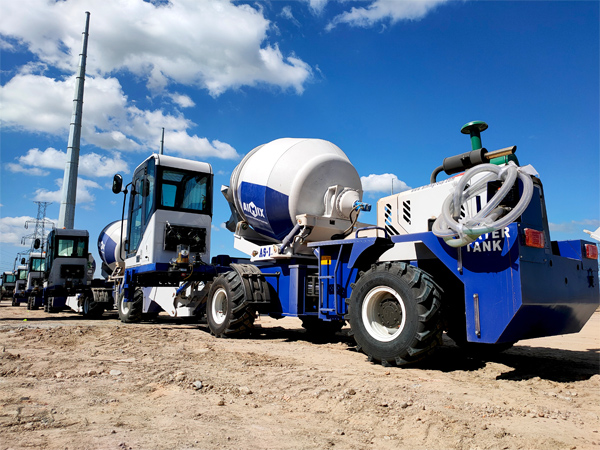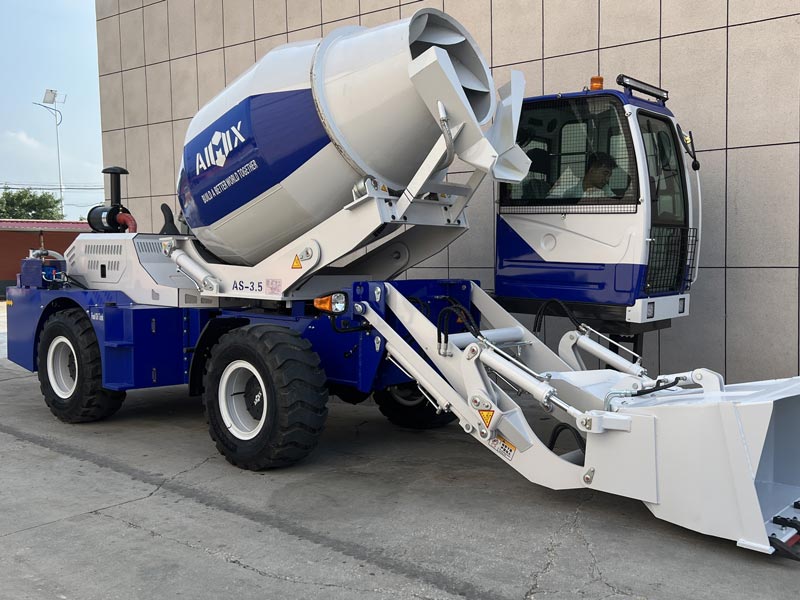Oil Leakage and Seepage in Self Loading Concrete Mixer Trucks
Oil leakage and seepage in self-loading concrete mixer trucks can lead to several issues. These problems can affect the truck's performance, cause environmental hazards, and increase maintenance costs. Understanding the causes and solutions for oil leakage and seepage is essential for maintaining your mixer truck's efficiency. In this blog, we will explore the common causes, potential solutions, and preventive measures for oil leakage and seepage in self-loading concrete mixer trucks.

Common Causes of Oil Leakage and Seepage
Identifying the common causes of oil leakage and seepage in self-loading concrete mixer trucks can help you address these issues promptly. Below are some of the primary causes.
Worn-out Seals and Gaskets
Worn-out seals and gaskets are a common cause of oil leakage. Over time, these components can deteriorate, leading to gaps and cracks. This allows oil to escape from the system.
Regularly inspecting and replacing seals and gaskets can help prevent oil leakage. Use high-quality replacement parts to ensure durability and reliability.
Loose or Damaged Connections
Loose or damaged connections can also lead to oil seepage. Vibrations and regular use can cause connections to become loose or damaged, allowing oil to leak out.
Check all connections regularly and tighten or repair them as needed. Ensuring that connections are secure can help prevent oil seepage.
Overfilled Oil Reservoir
An overfilled oil reservoir can cause oil to seep out. When the reservoir is overfilled, the excess oil can find its way out through seals and connections.
Always fill the oil reservoir to the recommended level. Avoid overfilling to prevent oil seepage and maintain optimal performance.
Cracked or Damaged Oil Lines
Cracked or damaged oil lines can lead to significant oil leakage. These lines can become damaged due to wear and tear, impact, or exposure to harsh conditions.
Inspect oil lines regularly for signs of damage. Replace any cracked or damaged lines promptly to prevent oil leakage.

Potential Solutions for Oil Leakage and Seepage
Addressing oil leakage and seepage in self-loading concrete mixer trucks requires prompt action. Below are some common faults and solutions for self-loading mixers.
Replace Worn-out Seals and Gaskets
If you notice oil leakage from worn-out seals and gaskets, replace them immediately. Use high-quality replacement parts to ensure a proper fit and long-lasting performance.
Regularly inspect seals and gaskets for signs of wear and replace them as part of your routine maintenance schedule.
Tighten or Repair Connections
Loose or damaged connections can be tightened or repaired to prevent oil seepage. Check all connections regularly and ensure they are secure.
If you find any damaged connections, repair or replace them promptly. Properly secured connections can help prevent oil seepage.
Monitor Oil Levels
Regularly monitor the oil levels in the reservoir. Ensure that the oil level is within the recommended range. Avoid overfilling the reservoir to prevent oil seepage.
Use a dipstick or sight glass to check the oil level. Adjust the oil level as needed to maintain optimal performance.
Inspect and Replace Oil Lines
Inspect oil lines for any signs of cracks or damage. Replace any damaged oil lines promptly to prevent oil leakage. Use high-quality replacement oil lines to ensure durability and reliability.
Regular inspections can help identify potential issues early and prevent significant oil leakage.
Preventive Measures to Avoid Oil Leakage and Seepage
Preventive measures can help avoid oil leakage and seepage in self-loading concrete mixer trucks. Implementing these measures can ensure the efficiency and longevity of your mixer truck.
Regular Maintenance
Regular maintenance is crucial for preventing oil leakage and seepage. Follow the manufacturer's recommended maintenance schedule and perform routine inspections.
Address any issues promptly to prevent further damage. Regular maintenance can help keep your mixer truck in optimal condition.
Use High-Quality Parts
Using high-quality parts can prevent oil leakage and seepage. Invest in high-quality seals, gaskets, oil lines, and other components to ensure durability and reliability.
High-quality parts can withstand wear and tear better, reducing the risk of oil leakage and seepage.
Proper Training
Proper training for operators can also help prevent oil leakage and seepage. Ensure that operators are trained to handle the mixer truck correctly and perform routine inspections.
Training can help identify potential issues early and prevent them from escalating into significant problems.
Monitor Environmental Conditions
Monitor the environmental conditions in which the mixer truck operates. Exposure to extreme temperatures, harsh chemicals, and rough terrains can cause damage to seals, gaskets, and oil lines.
Protect the mixer truck from harsh conditions whenever possible. Use protective measures to minimize the impact of environmental factors on the truck's components.
Conclusion
Oil leakage and seepage in self-loading concrete mixer trucks can lead to several issues. Identifying the common causes, addressing potential solutions, and implementing preventive measures can help maintain your mixer truck's efficiency.
Regular maintenance, using high-quality parts, proper training, and monitoring environmental conditions are crucial for preventing oil leakage and seepage. By following these tips, you can ensure the optimal performance and longevity of your self-loading concrete mixer truck. Implementing these practices will help you avoid costly repairs and maintain a safe and efficient operation.